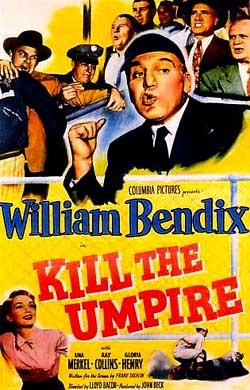
Oh, sure. I could have gone with a picture of Russel Crowe or Kirk Douglas here, but I like to think you all expect a little more thought put into the joke pictures we use here at the RFT.
There's something you don't see everyday, I thought to myself, and clicked on the item in question. What exactly I was expecting I'm not sure, but the story turned out to be much more interesting than I anticipated.
See, we all like to complain about the shoddy officiating in our sports, be it fouls not called on the home team in the NBA or a shape-shifting strike zone whenever Eduardo Sanchez comes in to pitch. (Seriously, I've never in my life seen a pitcher so consistently hurt by poor ball/strike calls. It must be something about the way he throws that makes it hard to pick the ball up or something.)
However, it turns out there was a dude who lived a couple thousand years ago who has much more reason to complain than any of us.
However, it turns out there was a dude who lived a couple thousand years ago who has much more reason to complain than any of us.
Seems there was some officiating problems in the gladiator's final match. He had beaten down his opponent, who signaled his submission. However, the referee apparently failed to see the submission, and allowed the match to continue, at which point the fallen opponent resumed the fight and fatally stabbed Diodorus. Whether the error was an honest one or foul play was suspected is unknown. The ref's name was apparently Timus Donaghus, though, so draw your own conclusions.

I have that exact suit. Also, I would like to point out how clever I am for using a villain whose sidekick was named Virgil in a column about ancient Rome.
I would just like to point out, first of all, that I'm pretty sure this exact same thing happened to the British Bulldog at least once that I can recall, with the referee being distracted as his opponent hit him with a handy Intercontinental Belt. If I remember correctly, a match involving the late, great Macho Man Randy Savage actually involved the ref being knocked out, while Macho Man's opponent (might have been the Million Dollar Man, now that I think of it, but don't quote me on that), totally wailed on him with a steel chair. So personally, I don't think Diodorus has much of a leg to stand on.
What do you think the odds are that one of the Roman ringside announcers (they totally had those, right?), was yelling while this went down that the fanfare being blown on the trumpets was, in fact, the theme music of Demetrius, nemesis and eventual killer of Diodorus? I would lay money on it.
So just remember, the next time we see a hitter strike out on what is clearly an outside pitch or watch as the refs throw a pass interference flag on incidental contact, it could always be worse. Or better, I suppose, if you're into fatal stabbings. Which I assume most, if not all, of you are.

